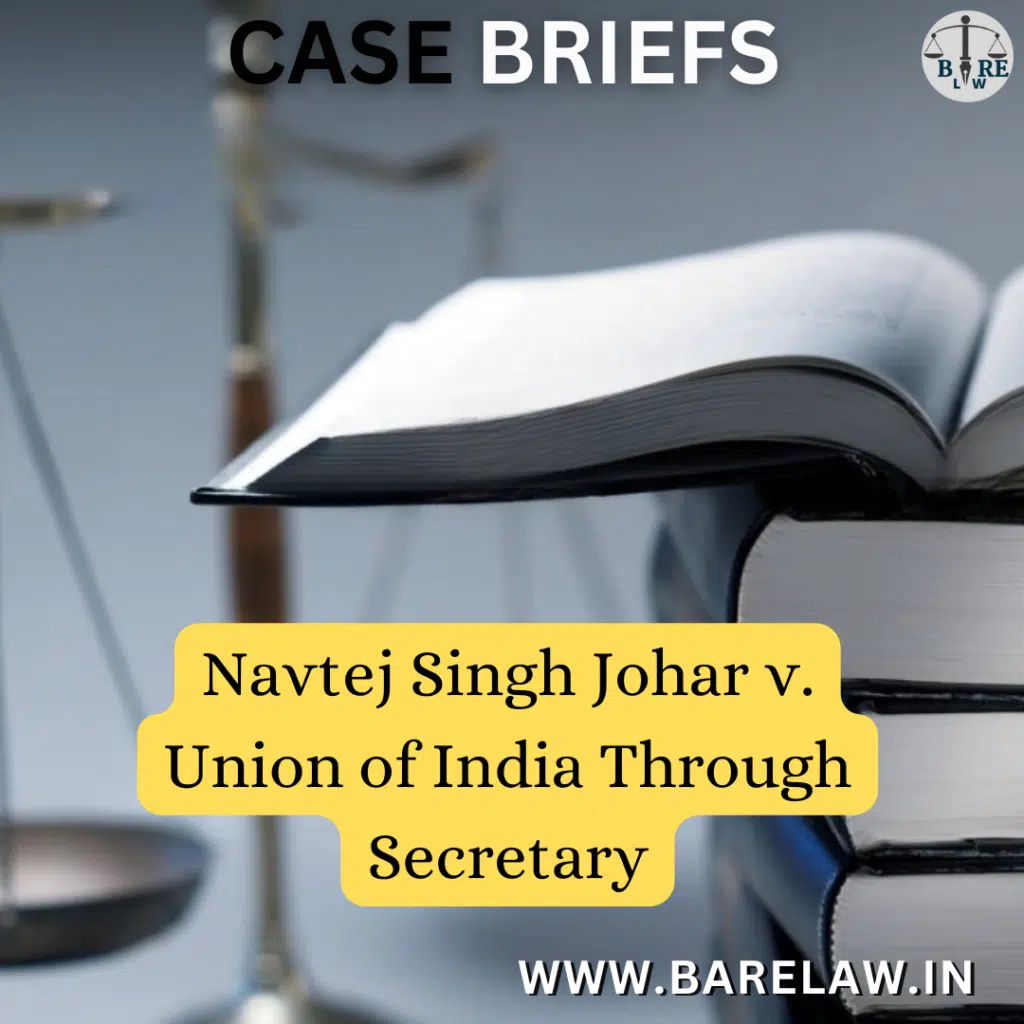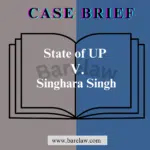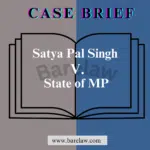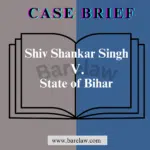
Table of Contents
Navtej Singh Johar v. Union of India Through Secretary, Ministry of Law and Justice
Navtej Singh Johar v. Union of India Through Secretary, Ministry of Law and Justice
Date of Decision
September 6, 2018
Facts
- Petitioners: The case was filed by Navtej Singh Johar, a renowned dancer and LGBT rights activist, along with several other petitioners representing the LGBTQ+ community.
- Section 377 of the Indian Penal Code (IPC): The case specifically challenged the constitutional validity of Section 377 of the IPC. Section 377 criminalized “unnatural offenses,” including consensual sexual acts between individuals of the same sex.
- Violation of Fundamental Rights: The petitioners argued that Section 377 violated their fundamental rights, including the rights to equality, privacy, and dignity guaranteed under Articles 14, 15, and 21 of the Constitution of India. They contended that the provision disproportionately targeted and stigmatized the LGBTQ+ community, resulting in discrimination and infringement of their constitutional rights.
- Historical Background: The court examined the historical background of Section 377 and its impact on the lives of individuals belonging to the LGBTQ+ community. It acknowledged the stigma, discrimination, and harassment faced by sexual minorities due to the criminalization of same-sex relationships.
- International Legal Developments: The court considered the evolving international legal landscape and the growing recognition of the rights of LGBTQ+ individuals. It referred to various international conventions, judicial decisions, and legal developments that supported the decriminalization and protection of sexual minorities.
- Constitutional Principles: In its analysis, the court emphasized the importance of upholding constitutional principles, including equality, non-discrimination, and personal autonomy. It recognized the need to protect the rights and dignity of LGBTQ+ individuals and ensure equal treatment under the law.
- Rights of Sexual Minorities: The petitioners highlighted the impact of Section 377 on the lives and well-being of sexual minorities. They presented evidence of discrimination, harassment, and the violation of their fundamental rights due to the criminalization of same-sex relationships.
Based on these facts, the case challenged the constitutionality of Section 377 and the impact it had on the LGBTQ+ community. The court examined the historical context, international legal developments, and constitutional principles to assess whether Section 377 violated the fundamental rights of sexual minorities. The case raised significant questions regarding equality, privacy, and dignity, and its outcome would have far-reaching implications for LGBTQ+ rights in India.
Issues
- Constitutional Validity of Section 377: The primary issue in the case was the constitutional validity of Section 377 of the Indian Penal Code (IPC), which criminalized consensual sexual acts between individuals of the same sex. The court examined whether this provision violated the fundamental rights guaranteed under the Constitution of India.
- Right to Equality: The case involved the question of whether Section 377 violated the right to equality enshrined in Article 14 of the Constitution. It explored whether the provision treated individuals belonging to the LGBTQ+ community differently, leading to discrimination and the denial of equal protection under the law.
- Right to Privacy: The case addressed the issue of the right to privacy and its application to intimate and personal choices, including consensual same-sex relationships. The court examined whether criminalizing such relationships infringed upon an individual’s right to privacy protected under Article 21 of the Constitution.
- Dignity and Non-Discrimination: The case raised concerns regarding the violation of an individual’s dignity and the principle of non-discrimination. It explored whether Section 377 stigmatized and marginalized individuals based on their sexual orientation, leading to the denial of their inherent dignity and equality.
- International Legal Standards: The court considered international legal developments and standards relating to the rights of LGBTQ+ individuals. It examined whether Section 377 was inconsistent with these standards and whether India should align its laws with evolving global norms.
- Social Stigma and Discrimination: The case addressed the issue of social stigma and discrimination faced by individuals belonging to the LGBTQ+ community due to the criminalization of same-sex relationships. It examined whether Section 377 perpetuated societal biases and hindered the acceptance and inclusion of sexual minorities.
- Interpretation of Constitutional Provisions: The case involved an interpretation of various constitutional provisions, including Articles 14, 15, 19, and 21 of the Constitution of India. The court examined these provisions in the context of LGBTQ+ rights and the impact of Section 377 on the fundamental rights of individuals.
These issues in Navtej Singh Johar v. Union of India reflect the constitutional, equality, and privacy dimensions of the case. The court’s decision would have significant implications for the recognition and protection of LGBTQ+ rights, the principle of equality, and the right to privacy in India.
Holding
- Unconstitutionality of Section 377: The court held that Section 377 of the Indian Penal Code (IPC), to the extent that it criminalized consensual sexual acts between individuals of the same sex, is unconstitutional and void. The provision violated the fundamental rights of LGBTQ+ individuals, including their rights to equality, privacy, and dignity.
- Equality and Non-Discrimination: The court recognized that sexual orientation is an intrinsic aspect of an individual’s identity and upheld the principle of equality. It held that LGBTQ+ individuals are entitled to the same rights and protections as any other citizen, and discrimination based on sexual orientation is prohibited.
- Right to Privacy: The court affirmed that the right to privacy includes the right to sexual autonomy and the freedom to choose one’s partner. It held that criminalizing consensual same-sex relationships violated an individual’s right to privacy, personal autonomy, and dignity.
- Overruling Previous Judgments: The court overruled its earlier judgments in Suresh Kumar Koushal v. Naz Foundation and Others (2013) and upheld the decision in National Legal Services Authority v. Union of India (2014), which recognized the rights of transgender individuals.
- Decriminalization of Same-Sex Relationships: The court decriminalized consensual sexual acts between adults of the same sex, stating that such acts would no longer be treated as a criminal offense under Section 377 of the IPC.
- Protection of LGBTQ+ Rights: The court acknowledged the need for society to accept and respect diverse sexual orientations and gender identities. It directed the government to take measures to protect the rights of LGBTQ+ individuals and to address the social stigma and discrimination they face.
- Evolving Interpretation of the Constitution: The court emphasized the evolving nature of constitutional interpretation, adapting to changing times and societal understanding. It recognized the need to interpret the Constitution in a manner that advances equality, non-discrimination, and fundamental rights.
Disposition
In the case of Navtej Singh Johar v. Union of India, (2018) 10 SCC 1, the Supreme Court of India provided the following disposition:
- Striking Down of Section 377: The court declared that the relevant parts of Section 377 of the Indian Penal Code (IPC), which criminalized consensual sexual acts between individuals of the same sex, were unconstitutional and void. The provision was struck down as it violated the fundamental rights of LGBTQ+ individuals, including their rights to equality, privacy, and dignity.
- Decriminalization of Same-Sex Relationships: The court decriminalized consensual sexual acts between adults of the same sex, clarifying that such acts would no longer be treated as a criminal offense under Section 377 of the IPC.
- Recognition of LGBTQ+ Rights: The court recognized and affirmed the rights of LGBTQ+ individuals, emphasizing the principles of equality, non-discrimination, privacy, and dignity. It held that LGBTQ+ individuals are entitled to the same rights and protections as any other citizen and that discrimination based on sexual orientation is prohibited.
- Overruling Previous Judgments: The court overruled its previous judgments in Suresh Kumar Koushal v. Naz Foundation and Others (2013) and upheld the decision in National Legal Services Authority v. Union of India (2014), which recognized the rights of transgender individuals.
- Government Action: The court directed the government to take proactive measures to protect the rights of LGBTQ+ individuals and address the social stigma and discrimination they face. It called for sensitization programs, awareness campaigns, and policy initiatives to foster acceptance and inclusion.
The disposition in Navtej Singh Johar v. Union of India reflects the court’s decision to strike down the relevant parts of Section 377, decriminalize consensual same-sex relationships, and recognize and protect the rights of LGBTQ+ individuals. The court’s ruling marked a significant step towards equality, dignity, and non-discrimination for sexual minorities in India.
Summary
Navtej Singh Johar v. Union of India, (2018) 10 SCC 1 is a landmark case in Indian jurisprudence that dealt with the constitutional validity of Section 377 of the Indian Penal Code (IPC). The case specifically focused on the criminalization of consensual same-sex relationships between adults. The petitioners, led by Navtej Singh Johar, challenged the constitutionality of Section 377, arguing that it violated their fundamental rights to equality, privacy, and dignity.
They contended that the provision disproportionately targeted and stigmatized the LGBTQ+ community, resulting in discrimination and the infringement of their constitutional rights. In its analysis, the Supreme Court of India recognized the historical background of Section 377 and its impact on the lives of LGBTQ+ individuals. It acknowledged the stigma, discrimination, and harassment faced by sexual minorities due to the criminalization of same-sex relationships.
The court considered international legal developments and standards that recognized and protected the rights of LGBTQ+ individuals. It emphasized the evolving nature of constitutional interpretation and the need to interpret the Constitution in a manner that upholds equality, non-discrimination, and fundamental rights. In its landmark judgment,
the court held that Section 377, to the extent that it criminalized consensual sexual acts between individuals of the same sex, is unconstitutional. It struck down the provision as it violated the fundamental rights of LGBTQ+ individuals, including their rights to equality, privacy, and dignity. The court decriminalized consensual same-sex relationships between adults, affirming the equal rights and protections for LGBTQ+ individuals.
It recognized the importance of acceptance, respect, and inclusion for sexual minorities, directing the government to take measures to protect their rights and address social stigma and discrimination. The decision in Navtej Singh Johar v. Union of India represented a significant milestone in the recognition and protection of LGBTQ+ rights in India. It marked a departure from the discriminatory approach towards same-sex relationships, upholding the principles of equality, privacy, and dignity. The judgment brought about a positive shift in societal attitudes, fostering inclusivity and ensuring equal treatment under the law for sexual minorities in the country.



